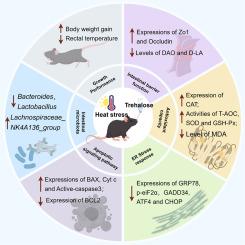海藻糖通过抑制内质网应激和调节肠道菌群改善小鼠热应激诱导的肠道屏障功能障碍。
IF 4.9
2区 医学
Q1 BIOCHEMISTRY & MOLECULAR BIOLOGY
引用次数: 0
摘要
热应激(HS)损害肠道屏障的完整性和微生物群的稳态。海藻糖是一种非还原性双糖,是一种众所周知的分子伴侣,可以防止蛋白质在压力下错误折叠。然而,海藻糖补充是否会影响HS下的肠道屏障完整性和微生物群尚不清楚。将6周龄雄性C57BL/6小鼠随机分为3组(7只/组):正常对照组(CON, 23℃)、热应激组(HS, 42℃)和热应激 + 海藻糖组(HT, HS条件下饮水中添加2.0%海藻糖)。补充海藻糖可降低热应激小鼠的直肠温度和体重损失。海藻糖可通过上调occludin和Zo1等紧密连接蛋白的表达,抑制以d -乳酸增加为特征的hs诱导的肠通透性。补充海藻糖通过提高超氧化物歧化酶(SOD)和谷胱甘肽过氧化物酶(GSH-PX)活性以及过氧化氢酶(CAT)蛋白表达显著改善hs诱导的氧化应激。海藻糖干预可逆转热应激小鼠内质网应激蛋白葡萄糖调节蛋白78 (GRP78)、生长阻滞和DNA损伤诱导蛋白34 (GADD34)、磷酸化真核起始因子2α (p-eif2α)、活化转录因子4 (ATF4)、C/EBP同源蛋白(CHOP)以及促凋亡蛋白BAX、Cytc和活性caspase3的上调。添加海藻糖可显著提高热应激小鼠有益菌Lachnospiraceae_NK4A136_group的丰度,降低有害菌拟杆菌门(Bacteroidetes)的丰度。综上所述,这些结果表明,补充海藻糖可以通过降低氧化应激、逆转内质网应激诱导的细胞凋亡和肠道微生物生态失调来减轻HS诱导的肠道屏障功能障碍,表明海藻糖是一种很有前景的膳食添加剂,可以对抗HS诱导的小鼠肠道损伤。本文章由计算机程序翻译,如有差异,请以英文原文为准。

Trehalose supplementation ameliorates heat stress-induced intestinal barrier dysfunction by suppressing endoplasmic reticulum stress and modulating gut microbiota in mice
Heat stress (HS) compromises intestinal barrier integrity and microbiota homeostasis. Trehalose, a nonreducing disaccharide, is well known as a molecular chaperone to prevent protein misfolding under stress. However, whether trehalose supplementation can affect intestinal barrier integrity and microbiota under HS remains unknown. Male C57BL/6 mice (6-week-old) were randomly divided into 3 groups (7 mice/group): a normal control group (CON, 23℃), a heat stress group (HS, 42℃) and heat stress + trehalose group (HT, received 2.0% trehalose in drinking water under HS condition). Trehalose supplementation decreased rectal temperature and body weight loss in heat-stressed mice. HS-induced intestinal permeability characterized by increased d-lactate was inhibited by upregulating protein expression of tight junction proteins including occludin and Zo1 in mice administrated by trehalose. Supplementary trehalose significantly ameliorated HS-induced oxidative stress by elevating activities of superoxide dismutase (SOD) and glutathione peroxidase (GSH-PX) as well as protein expression of catalase (CAT). Trehalose intervention reversed the up-regulation of endoplasmic reticulum (ER) stress proteins glucose-regulated protein 78 (GRP78), growth arrest and DNA damage-inducible protein 34 (GADD34), phosphorylated eukaryotic initiation factor 2α (p-eif2α), activating transcription factor 4 (ATF4), and C/EBP homologous protein (CHOP) as well as proapoptotic proteins BAX, Cytc, and active-caspase3 in heat-stressed mice. Trehalose supplementation evidently elevated the abundance of beneficial bacteria Lachnospiraceae_NK4A136_group while reducing that of harmful bacteria Bacteroidetes in heat-stressed mice. Taken together, these results revealed that supplementary trehalose could attenuate HS-induced intestinal barrier dysfunction via reducing oxidative stress, reversing ER stress induced apoptosis and gut microbial dysbiosis, suggesting trehalose as a promising dietary additive to counteract the intestinal injury induced by HS in mice.
求助全文
通过发布文献求助,成功后即可免费获取论文全文。
去求助
来源期刊

Journal of Nutritional Biochemistry
医学-生化与分子生物学
CiteScore
9.50
自引率
3.60%
发文量
237
审稿时长
68 days
期刊介绍:
Devoted to advancements in nutritional sciences, The Journal of Nutritional Biochemistry presents experimental nutrition research as it relates to: biochemistry, molecular biology, toxicology, or physiology.
Rigorous reviews by an international editorial board of distinguished scientists ensure publication of the most current and key research being conducted in nutrition at the cellular, animal and human level. In addition to its monthly features of critical reviews and research articles, The Journal of Nutritional Biochemistry also periodically publishes emerging issues, experimental methods, and other types of articles.
 求助内容:
求助内容: 应助结果提醒方式:
应助结果提醒方式:


